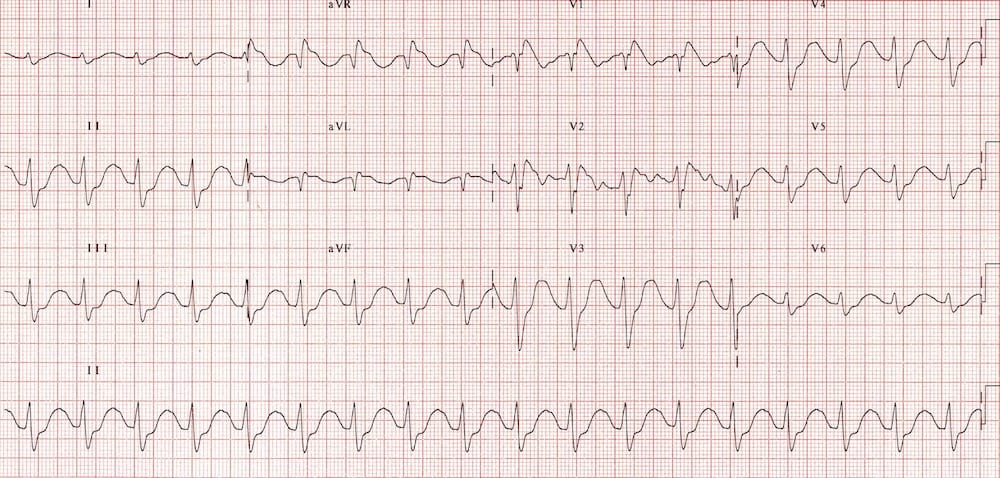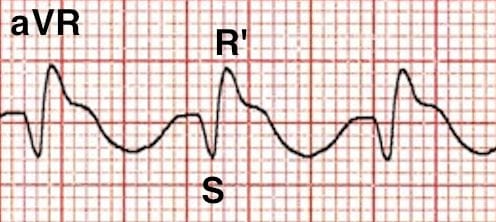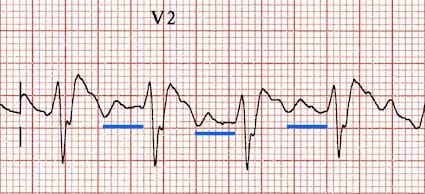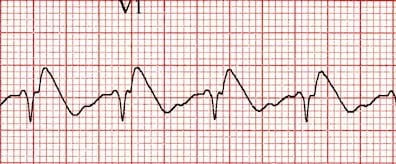ECG Case 055
Middle-aged patient presenting with drowsiness. BP 85/50. Pupils dilated. Interpret the ECG.

Describe and interpret this ECG
ECG ANSWER and INTERPRETATION
Main Abnormalities
This is a classic ECG of tricyclic antidepressant toxicity, demonstrating multiple characteristic abnormalities.
Signs of sodium-channel blockade
- Broad QRS complexes (120 ms, or 3 small squares).
- Positive R’ wave in lead aVR > 3 mm.
- Prolonged PR interval (240 ms).
- Long QT interval (> 1/2 the RR interval).
- Brugada-like pattern in V1.
Signs of anticholinergic toxidrome
Sinus tachycardia (~ 110 bpm), with P waves embedded in each T wave



This patient had taken a life-threatening overdose of dosulepin (a Tricyclic antidepressant TCA).
How to Spot Sodium-Channel Blockade
- QRS prolongation (> 100ms or 2.5 small squares), typically measured in lead II.
- A terminal or secondary R wave (R’ wave) in aVR > 3 mm.
- An R’/S ratio in aVR > 0.7.
Prognostic Value of the ECG
In patients with TCA overdose, the degree of QRS prolongation correlates with the degree of clinical toxicity:
- QRS width > 100 ms is predictive of seizures.
- QRS width > 160 ms is predictive of cardiotoxicity (e.g. broad-complex dysrhythmias, hypotension).
CLINICAL PEARLS
The combination of PR prolongation and sinus tachycardia with TCA overdose often makes the P waves difficult to see, and may lead the rhythm to be incorrectly identified as VT. This patient needs bicarbonate and hyperventilation, not electricity and amiodarone!
The clinical significance of a TCA-induced Brugada ECG pattern remains controversial — i.e. is it purely a manifestation of severe sodium-channel blockade, or does it represent “unmasking” of underlying Brugada syndrome? These issues are discussed here.
References
Further Reading
- Wiesbauer F, Kühn P. ECG Mastery: Yellow Belt online course. Understand ECG basics. Medmastery
- Wiesbauer F, Kühn P. ECG Mastery: Blue Belt online course: Become an ECG expert. Medmastery
- Kühn P, Houghton A. ECG Mastery: Black Belt Workshop. Advanced ECG interpretation. Medmastery
- Rawshani A. Clinical ECG Interpretation ECG Waves
- Smith SW. Dr Smith’s ECG blog.
- Wiesbauer F. Little Black Book of ECG Secrets. Medmastery PDF
TOP 100 ECG Series
Emergency Physician in Prehospital and Retrieval Medicine in Sydney, Australia. He has a passion for ECG interpretation and medical education | ECG Library |
